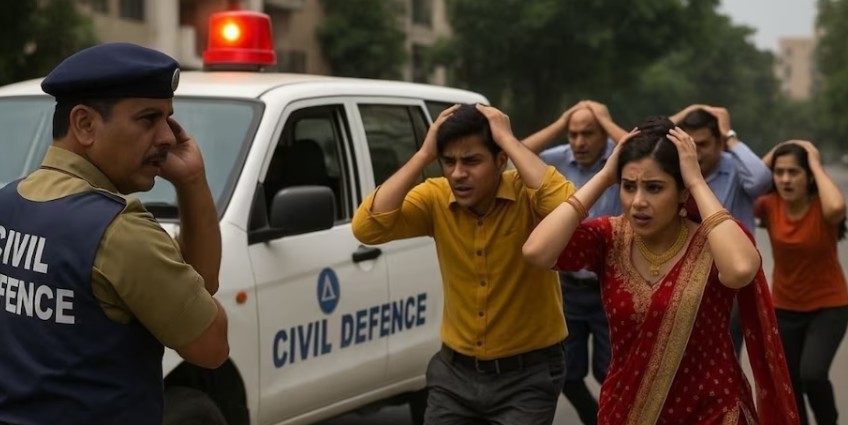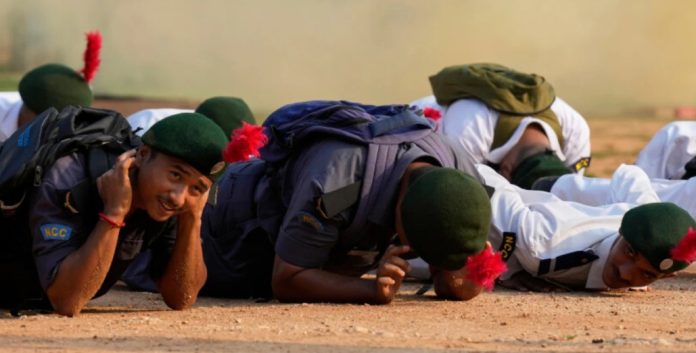A significant, multi-state civil defence mock drill, meticulously planned to enhance emergency preparedness across India’s western border regions, has been unexpectedly postponed in Punjab, Rajasthan, and Gujarat, among other states and Union Territories. This crucial exercise, dubbed ‘Operation Shield,’ was originally slated to be conducted on Thursday, May 29, 2025, but a late directive from the Union Home Ministry and subsequent state-level communications confirmed its deferral due to what authorities cited as “administrative reasons.” The decision has prompted widespread communication efforts to inform the public and reassurances from various state administrations regarding their continued vigilance and preparedness.
‘Operation Shield’ was designed as a comprehensive civil defence exercise aimed at bolstering the readiness of districts adjoining the western border, including Jammu and Kashmir, Punjab, Haryana, Rajasthan, Gujarat, and Chandigarh, against potential air raids, drone attacks, and missile threats. Such drills are vital for simulating real-world emergency scenarios, testing the efficiency of existing response mechanisms, and fostering seamless coordination among various agencies. The exercise typically involves the activation of centrally controlled air raid sirens, implementation of complete blackout measures in civilian areas, and the practice of civilian evacuation protocols, particularly near sensitive installations and military stations. It is a critical component of national security preparedness, particularly in light of recent geopolitical developments and heightened border tensions.
The urgency for such drills gained prominence following ‘Operation Sindoor,’ a significant Indian retaliatory strike conducted on May 7, 2025, targeting terror camps across the border in Pakistan-Occupied Kashmir (PoK) in response to a terror attack in Pahalgam on April 22, which claimed 26 lives. The subsequent days saw intense cross-border exchanges, including missile strikes and drone incursions, which were successfully thwarted by Indian air defence systems. These events underscored the imperative for robust civil defence mechanisms and the need for civilian populations in border areas to be fully aware and prepared for potential hostilities. A previous civil defence exercise, ‘Operation Abhyas,’ conducted on May 7, had reportedly revealed critical gaps in preparedness, prompting the directives for more comprehensive drills like ‘Operation Shield’ to address these lacunae.
The postponement announcement, delivered just hours before the scheduled drill, understandably generated queries among the public and the various agencies involved. In Rajasthan and Gujarat, official statements from the respective Home Departments confirmed the deferment due to administrative reasons, indicating that new dates for the exercise would be announced subsequently. Haryana also postponed the drill following instructions from the Union Home Ministry. The Central Bureau of Communication, Chandigarh, utilized social media to inform the public, stating, “No blackout or mock drill will be held tomorrow. Inconvenience is regretted.” This swift communication was essential to prevent any confusion or panic among citizens who had been expecting sirens and blackout measures.

Punjab, specifically, took a slightly different approach while complying with the central directive. The Punjab government, through its Home Department, wrote to the Centre on Wednesday, proposing June 3, 2025, as a revised date for conducting its civil defence exercise. This request was made due to the fact that a significant portion of their civil defence staff and best volunteers were currently undergoing intensive training being conducted by the National Disaster Response Force (NDRF). A senior Punjab Police officer confirmed that the Centre accepted the state government’s request, acknowledging the logistical challenges of conducting the drill without its key personnel. This highlights the importance of trained volunteers and the need for inter-agency coordination, even at the state level.
The decision to postpone, while attributed to “administrative reasons,” implicitly points to a complex interplay of factors. It could be related to internal resource allocation, unforeseen operational requirements, or a need for further refinement of the drill’s protocols based on intelligence inputs. The fact that Punjab’s key civil defence personnel were engaged in NDRF training underscores the dynamic nature of preparedness and the constant need for skill enhancement and coordination among various disaster management and security agencies.
The states of Punjab, Rajasthan, and Gujarat hold immense strategic importance in India’s defence posture. Punjab, with its extensive international border and history of cross-border challenges, including the increasing threat of drone infiltration, necessitates constant vigilance. Rajasthan, with its vast desert terrain stretching along the border, presents unique logistical and operational challenges for civil defence. Gujarat, with its long coastline and vital industrial infrastructure, is vulnerable to both maritime threats and potential aerial attacks. Therefore, the effective conduct of civil defence drills in these regions is paramount for national security and the safety of their populations.
The absence of the drill on its originally planned date does not, however, imply a lapse in preparedness. Officials across these states have reiterated their commitment to maintaining a high state of readiness. The essence of civil defence lies in a layered approach to emergency response, involving not just specialized forces but also local administration, community volunteers, and a well-informed citizenry. Organizations like the National Cadet Corps (NCC), National Service Scheme (NSS), Nehru Yuva Kendra Sangathan (NYKS), and Bharat Scouts & Guides are integral to these efforts, mobilizing youth volunteers to assist civil administration in implementing various measures, including air raid warnings, rescue operations, and first aid.
As Punjab prepares for its rescheduled drill on June 3, and other states await new directives, the focus remains squarely on refining emergency response strategies. These exercises serve a dual purpose: to test the operational capabilities of various agencies and to sensitize the civilian population about protocols in times of crisis. The comprehensive nature of ‘Operation Shield,’ involving elements like complete blackouts and air raid siren activations, underscores the seriousness with which authorities view the need for a robust and adaptive civil defence framework. The postponement, while a minor disruption, ultimately reflects a commitment to ensuring that when these crucial drills are conducted, they are done so with maximum effectiveness and optimal participation, truly enhancing the collective resilience of India’s border states.


